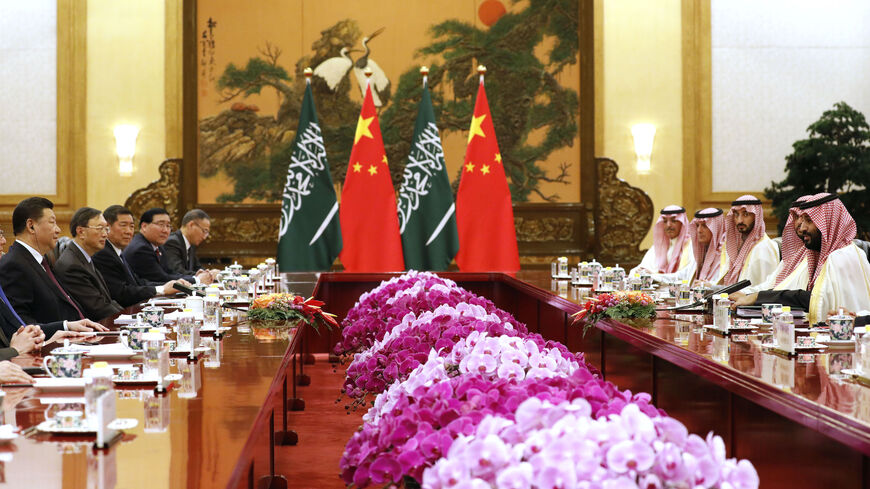Defense deals between Saudi Arabia and China have been starkly absent from President Xi Jinping's landmark visit to the kingdom which concluded on Saturday and saw expansion of economic, energy and tech cooperation.
The summits that the Chinese leader held in Riyadh with Saudi and Arab leaders included agreements on nuclear energy, space exploration and both 5G and 6G technology, Xi said, but no new defense deals have been publicly disclosed.
A joint Saudi-Chinese statement on Friday stopped short of new defense announcements and said that the two sides “emphasized their determination to strengthen cooperation and coordination in various fields of defense,” including sharing intelligence on counterterrorism.
Pentagon and US intelligence officials have been watching the developments closely. Last month, senior Biden administration officials — wary of China’s inroads into the region’s arms and telecommunications markets — openly warned that certain deals between Arab states and China would force Washington to curtail its own cooperation with Gulf partners.
“It’s not that if China does x, y, or z, we will punish a country,” the Pentagon’s top policy chief Colin Kahl told reporters from Manama last month.
“It’s literally that in allowing China to establish infrastructure — it could be IT infrastructure, it could be a physical base, it could be the presence of certain air defense systems or advanced fighter aircraft that have certain sensors on them,” Kahl said, “that will actually provide a direct challenge to our systems, to [China’s] ability to collect [intelligence] on us, to their ability to get access to our networks.”
Riyadh on Thursday signed a memorandum of understanding for further work with Huawei on cloud computing and to run high-tech complexes in the kingdom, though Washington has not yet publicly commented on the deal.
Late last year, the United Arab Emirates (UAE) walked away from acquiring the US’ F-35 fighter jet after the Biden administration paused the transfer and then pressed Abu Dhabi to drop its contracts with Huawei for 5G networks.
The UAE later purchased a dozen Chinese-made L-15 training jets in an unmistakable signal to Washington.
The Biden administration's halt to offensive arms sales to the Gulf over their conduct in the war in Yemen has contributed to a significant backlog of requests from regional governments, adding to friction in ties and raising concern among some analysts and former officials in Washington that the policy could open more opportunities for China.
That the White House has sought to advance military cooperation with Gulf states and continues to provide defensive weapons and intelligence even as it says it is reevaluating its relationship with Saudi Arabia over the OPEC+ dispute is perhaps the clearest sign that the Biden administration is wary about ceding too much of its security role in the region.
Current and former US officials say air defenses remain Arab Gulf states’ most sought-after military hardware as they face the threat of Iran’s missiles and drones. But China’s designs on Taiwan and Russia’s war in Ukraine have placed even greater strain on typically thin US stockpiles.
Politico reported last week that the Pentagon plans to pull National Advanced Surface-to-Air Missile System (NASAMS) air defenses from Oman and Qatar in order to send them to Ukraine, in the latest withdrawal of such systems from the Middle East.
“The US doesn’t have an effective cost-effective mobile C-UAV [Counter-Unmanned Aircraft] platform that it can sell,” Grant Rumley, fellow at the Washington Institute for Near East Policy and former Pentagon policy official, told Al-Monitor.
Privately, Arab officials have expressed disappointment that Washington refuses to provide its C-RAM air defense system — which it uses to guard its own bases in the region from drone and rocket attacks — to partners outside of the Western Five Eyes alliance.
While the US sale of 10 Fixed Site-Low, Slow, Small Unmanned Aircraft System Integrated Defeat Systems (FS-LIDS) counter-drone systems to Qatar last week could potentially be a sign of things to come, it’s likely that Gulf states will continue to explore other options, including those offered by Beijing.
Recent claims in Chinese media following the Zhuhai Air Show last month that Riyadh had agreed to purchase some $4 billion worth of TB001 armed drones, YJ-21 hypersonic anti-ship ballistic missiles and Poly Technologies’ Silent Hunter laser counter-drone platform from Beijing remain unsubstantiated.
"The [Biden] administration’s ambitions to build a regional security architecture, which is explicit in the administration’s strategy documents, is running headlong into the prevailing political hesitation to arm Gulf partners,” Jonathan Lord, director of the Middle East Security Program at the Center for a New American Security, told Al-Monitor.
“Gulf nations have security interests and if the US is unwilling to sell them the systems they’re asking for, they will find alternatives,” Lord said. “Washington needs to be clear-eyed about its policy goals and understand there are costs associated with its choices. Half-in, half-out isn’t working.”
And while most analysts say Beijing has no interest in attempting to replace the United States as the Middle East’s primary security guarantor anytime soon, it is better positioned to help Saudi Arabia achieve its goals of boosting the independence of its own defense industrial base.
In March of this year, China’s third-largest state-run electronics firm signed a joint venture with Riyadh’s ACES Co. to locally develop Saudi UAVs — something that experts say would take far longer for US firms to accomplish.
Rumley noted, “We’re not in the business of helping them produce their own UAV capability."
Of Beijing’s wider inroads into the Middle East's drone sales, he said, “China very accurately assessed a gap in the market, and by extension advanced their image.”
Riyadh also announced last year it would not work with foreign companies that do not have a regional headquarters on its soil — another area in which experts say Chinese state-run firms have the advantage.
“The basic point is we don’t want countries to develop military supply relations with a country like China, or for that matter Russia, because that leads to political dependence and opposing diplomatic relations,” James Jeffrey, former US ambassador to Turkey and Iraq who now chairs the Middle East Program at the Wilson Center in Washington.
“How strongly we will push this on which system, is another question. Again, [the Biden administration] will look at that in relation to all of the other issues on the plate in the relationship,” Jeffrey said, citing the example of Washington's decision to expel NATO ally Turkey from the F-35 program over its acquisition of Russia's S-400 air defense system in 2019.
“I would say, so far the Saudis have not gone over that line. We'll see," he added.
A representative of the Saudi Embassy in Washington did not return Al-Monitor’s request for comment by publication time.








